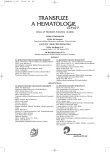-
Medical journals
- Career
Evaluation of antigen-specific lymphocytes anti-tumour effect with use of non-radioactive cytotoxicity test
Authors: L. Zahradová 1,2; D. Očadlíková 1; L. Kovářová 1,3; R. Hájek 1,2; A. Buliková 3; M. Penka 3; J. Michálek 1,4
Authors‘ workplace: Laboratoř experimentální hematologie a buněčné imunoterapie (LEHABI), FN Brno, Bohunice, 2Interní hematoonkologická 1; klinika, FN Brno - Bohunice, 3Oddělení klinické hematologie, FN Brno - Bohunice, I. dětská interní klinika, FN Brno, Dětská nemocnice 4
Published in: Transfuze Hematol. dnes,12, 2006, No. 4, p. 244-248.
Category: Comprehensive Reports, Original Papers, Case Reports
Overview
Objectives:
Cytotoxicity test using radioactive chromium 51Cr has been standardly used to evaluate specific cytolytic activity of T lymphocytes. This test has some significant disadvantages because of the high non-specific background caused by spontaneous release of 51Cr from target cells, low sensitivity, and health risks associated with the use of a radioactive isotope. To avoid these limitations we have introduced a cytotoxicity test using 5-(6-) karboxyfluorescein diacetate succinimidyl ester (CFSE) and propidium iodide (PI).Aim:
The aim of this study was to evaluate cytotoxic effect of antigen-specific T lymphocyte using a non-radioactive test with CFSE and PI staining.Methods:
The model of cytotoxic T lymphocytes specific to multiple myeloma cell line ARH 77 was used. Activated myeloma-specific T cells that produce interferon-γ were isolated using immunomagnetic beads and further expanded in vitro. T lymphocyte labeled with CFSE were co-cultured with ARH77 target cells. To identify target cells in late apoptosis or necrosis, PI was used and measured by flow cytometry.Results:
The optimal staining concentration of CFSE has been found (1μM). Cytotoxicity has been evaluated with effector cells:target cells ratio 2 : 1, 10 : 1 and 50 : 1 after 4, 24 and 48 hours of in vitro cultivation. Tumor specificity has been verified by 2 sets of controls: third-party PBMC as negative control target cells and expanded CFSE-labeled interferon gamma negative fraction of T cells as negative control effector cells.Conclusion:
The newly established cytotoxicity test is a valuable instrument to evaluate effector part of the immune system and efficacy of anticancer vaccines.Key words:
cytotoxicity test, CFSE, cytotoxic T lymphocytes
Labels
Haematology Internal medicine Clinical oncology
Article was published inTransfusion and Haematology Today

2006 Issue 4-
All articles in this issue
- Quality parameters of cryopreserved red cells reconstituted in AS-3 solution (Nutricel)
- Computer crossmatch - performance, validation and first implementation in the Czech Republic
- Indications of allogeneic and autologous haematopoietic cells transplantations. Recommendations of the Czech Socienty of Haematology and Czech Society of Oncology of the J. E. Purkyně Czech Medical Association
- The risk factors analysis in 248 patients with B-cell chronic lymphocytic leukemia at diagnosis
- Significance of immunotherapy with anti-CD20 rituximab and high-dose chemotherapy with autologous peripheral blood stem-cell transplantation in first-line treatment for mantle-cell lymphoma – centre experience
- Evaluation of antigen-specific lymphocytes anti-tumour effect with use of non-radioactive cytotoxicity test
- B-cell chronic lymphocytic leukemia Part III: Current conventional options of first-line treatment
- Transfusion and Haematology Today
- Journal archive
- Current issue
- Online only
- About the journal
Most read in this issue- Computer crossmatch - performance, validation and first implementation in the Czech Republic
- Significance of immunotherapy with anti-CD20 rituximab and high-dose chemotherapy with autologous peripheral blood stem-cell transplantation in first-line treatment for mantle-cell lymphoma – centre experience
- Quality parameters of cryopreserved red cells reconstituted in AS-3 solution (Nutricel)
- Evaluation of antigen-specific lymphocytes anti-tumour effect with use of non-radioactive cytotoxicity test
Login#ADS_BOTTOM_SCRIPTS#Forgotten passwordEnter the email address that you registered with. We will send you instructions on how to set a new password.
- Career

